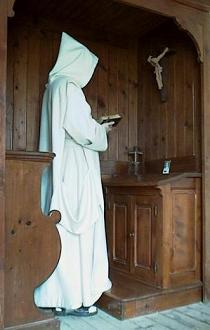 “St Bruno conceived of the Carthusian vocation as the search
for God alone, thus making the ultimate concern of every human life the only
concern of the Carthusian life, which achieves this in the utter simplicity of
a pure heart that is animated by Love’s singleness of purpose and has focussed
itself in a total ‘one‑pointedness,’ a ‘still‑pointedness,’ solely upon loving
God for His own sake, in all things, with this one and only Divine Love with
which He loves Himself.
“St Bruno conceived of the Carthusian vocation as the search
for God alone, thus making the ultimate concern of every human life the only
concern of the Carthusian life, which achieves this in the utter simplicity of
a pure heart that is animated by Love’s singleness of purpose and has focussed
itself in a total ‘one‑pointedness,’ a ‘still‑pointedness,’ solely upon loving
God for His own sake, in all things, with this one and only Divine Love with
which He loves Himself.
“From this sense of vocation to live for love of God alone
flows that marvelous detachment from everything that is not purely God alone,
in Himself. Thus even the most cherished and choice means must be used with the
same detachment that St Bruno showed when the Divine Will of God’s Good
Pleasure was manifested through the call of Divine Providence demanding that
he willingly sacrifice his personal vocation with its proper spirituality and
even his nascent community and their hermitage.
“By the ‘Vita abstracta’ is meant the living exclusively of
the one thing necessary — that is, the ‘better part’ — of sitting at the
Lord’s feet entirely absorbed in Him alone. In this we discover the spirit of
Spiritual Virginity which is the deliberate entrance into the mystery of the
Eternal repose and Sabbath rest that is in God Himself. He calls the solitary
contemplative into physical solitude so
as to pass through inner solitude into the very Solitude that God is, as
He rests in Himself. In the abandonment of all preoccupations for the sake of
that freedom from all divisive care and distracting concerns that enables the
exclusive, attentive receptivity and waiting upon God alone, the spiritual
Virgin attains to that complete silencing which disengages the body, mind and
spirit from all attachments to created things to be freely united to God in an
habitual union. In this lies the secret apostolic fecundity of the
Carthusian’s hidden ministry of contemplative prayer and sacrifice in the
Church, cooperating in her redemptive mission through the sanctity of his life
‘hidden with Christ in God’ in the solitude of the cell. Clearly, this is the
function of Virginity in the heart of the Church, the Virginal Body and Bride
of Christ, which is her most essential characteristic in her relationship with
her Lord and Divine Spouse. In this she is disengaged from every created concern
and temporal care so as to attend in loving receptivity to His glorious,
deifying, transcendent immanence ever present in her heart, where He, in
perfect love of her, brings her to birth by enabling her to love Him with the
very Divine Love with which He infinitely and eternally loves Himself. Thus
are His nuptials with her consummated as she joins Him in His Eternal Living
Sacrifice of Love in the Holy Spirit for the Father.” (pp. 80-81)
“In his letter to Raoul le Verde, St. Bruno wrote that stability
requires the great strength of soul — conviction
— for solitude is the realm only of the strong: “Here [in solitude] the strong
man is now free to enter into himself…here God will certainly recompense his
athletes for their labors with the best prize of all.” St. Bruno also admonished the Community of
Chartreuse to be certain that if one loses the most desirable opportunity for
Divine Union in solitude, this will be a constant regret relieved only when he
takes to heart the salvation of his soul by recovering the lost ground of his
vocation. Stability and constancy are therefore essential constituents of the
contemplative vocation in solitude. It requires calm perseverance and
continuity in effort. It demands a soul strong enough to renounce every escape
through dispersion, distraction and dissipation, for the soul must have no need
of being sustained by the diverse images of often‑renewed exterior activities.
The cell offers one fundamental activity and no other: the useful self‑application
to that ever-vigilant virginal receptivity which is contemplative prayer.” (p.
85)

No comments:
Post a Comment
Please be courteous and concise.